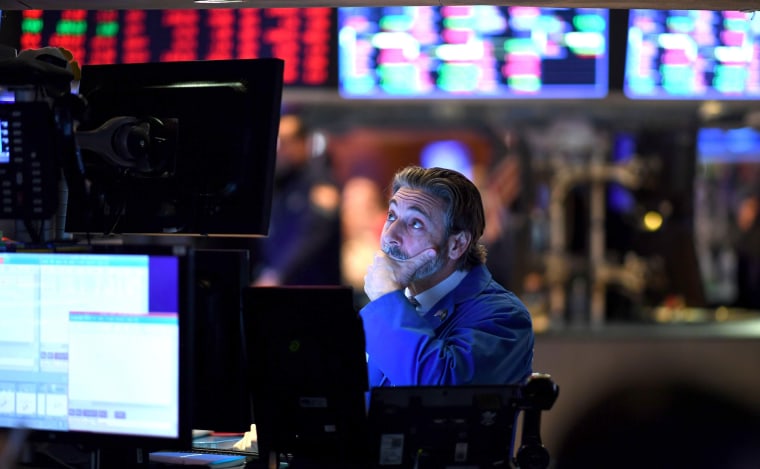Equities continued their weeklong drop on Friday, following an across-the-board fall in Asian and European markets as coronavirus news continued to weigh on investor sentiment.
The market on Thursday officially entered correction territory when it dipped 10 percent below its high. Although this was the sharpest slide since the financial crisis — and the largest one-day point loss for the benchmark Dow Jones Industrial Average in history — market experts and wealth managers say the first thing investors should do is take a deep breath.
“It doesn't surprise me that markets are down this morning. Institutional traders are probably not inclined to hold risk over the weekend, given that the overall environment is changing so quickly,” said Darrell Cronk, chief investment officer at Wells Fargo Wealth and Investment Management.
The conventional wisdom that retirement savers with a medium- to long-term time horizon should stay the course and ride out the gyrations remains true: A record-long bull market and sustained period of low volatility might make this week’s fall come as a shock, but investing pros say knee-jerk selling remains a mistake.
Corrections generally recover in an average of about four months, and experts point out that the economy is still generating some positive economic metrics: Personal income in January jumped by 0.6 percent, higher than anticipated, and household spending, while slowing, still grew in line with expectations. Mortgage rates — considered an important bellwether because of the amount of economic activity driven by home-buying — hit a three-year low.
“If you’re in the stock market, you should have a long-term horizon,” said Mark Zandi, chief economist at Moody’s Analytics. “We’re now in fear mode, but it can quickly turn around. Late 2018 is a pretty good case in point. It’s a lesson not to get caught up in the emotion.”
Zandi added, though, that investors likely haven’t seen the worst yet, given the growing spread of coronavirus and the many questions surrounding its transmission and fatality rates. “This suggests it's going to be highly disruptive to the economy. A 20 percent decline would not be out of the question… but that still doesn't mean you go out and sell,” he said.
The low-interest rate environment and minimal returns from fixed-income investments — yield on the 10-year Treasury note hovered barely above 1 percent on Friday, a record low — means that investors seeking returns have limited earnings options elsewhere.
“That’s why people are hanging on in equities. There isn’t an obvious place to go,” Zandi said.
For people nearing retirement or retirees, the math does change a little, experts say.
“For people who are already retired or who are close to retirement, they should have a portion of their assets readily available in cash equivalents so that when they need to dip into funds for living expenses, the funds will be available,” said Mitchell Goldberg, president of ClientFirst Strategy.
Having a cash cushion is advisable for people either in or near the distribution phase of their investing timeline.
That’s because of the negative sequence of returns principle, which means that people who have to cash in stocks when the market is falling wind up having to sell more shares to net the same distribution value — so when the stock market recovers that person will have fewer shares available to make up their losses.
“If you need that retirement money, then cash might not be such a bad idea for a while,” Zandi said.
This doesn’t mean flee the stock market entirely, but having a cash cushion is advisable for people either in or near the distribution phase of their investing timeline. “When you have assets on the sideline ready for financial obligations, you’ll tend to feel a lot better about going through a tough time,” Goldberg said.
While this week’s selloff has been broad-based, some sectors have been hit harder than others, which can be an opportunity for active investors who want to position their portfolio more defensively — or take an opportunity to buy on a dip. Travel, hospitality and leisure, materials and energy stocks have been under especially heavy pressure, a result of their exposure to lockdowns, flight cancellations and emerging markets.
“This is a very different kind of downturn than one we've ever experienced before,” Goldberg said. “Typically, in a downturn, consumer staples and healthcare are the kinds of stocks that will do well. Now it’s ‘screen stocks’ — companies that will allow you to work remotely, companies that keep you entertained, give you information,” he said.
“We changed some of our sector exposure to try to take a little more defensive posture,” Cronk said. “We were already underweight on our emerging market targets, but we moved additional money away from emerging markets,” he said. “We moved it back domestically into mid-caps, as a way to position toward a safer posture. We think the U.S. is a little more insulated than the rest of the world,” he said.
But Cronk emphasized that investors shouldn’t be making wholesale changes to their strategies based on one wild week. “We’d probably recommend against that at this juncture. When you get these quick market moves, most of that is led by sentiment, technicals and positioning — not really fundamentals. We just don't think it makes a lot of sense now to make material changes,” he said.
